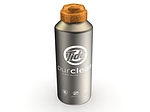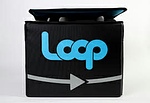Loop – Big Brands Invest in a No Waste Future
Once upon a time, shopping for food and toiletries generated little waste. Produce went into wooden crates or string bags. Staples like flour and sugar were purchased in bulk. Soap was cut from big blocks, and medicines came in glass bottles. It’s a quaint, sepia-toned picture, but these old-timey practices of refill and reuse are the cornerstones of Loop, a new joint venture between the small recycling company Terra-Cycle, and industry giants Procter & Gamble, Nestle, PepsiCo, Unilever, Clorox, Coca-Cola, and others.
Loop functions like milk delivery used to, but instead of dairy, Loop offers about 300 brand name products for delivery to your door in stylish, durable, and refillable containers, some specially designed for the Loop pro- gram. Let’s say you buy Crest mouthwash, Tide detergent, body wash, and some extra virgin olive oil from Loop. The price includes a one time deposit for each product’s container, and the order is delivered via UPS in a nifty reusable tote. When the products are used up, the empties go back in the tote, UPS picks it up, and the containers get cleaned, sterilized and refilled. If the customer doesn’t want a refill, they get their container deposit back. So the customer buys only the product and the company owns the container.
According to TerraCycle’s CEO and co-founder Tom Szaky, Loop containers are designed to last for 100 cycles, but they need to be cycled at least five times to make a serious impact on waste reduction. The hope is that brand loyalty, convenience, and the desire to reduce waste will persuade consumers to rethink purchasing products in single use containers and sign up for Loop.
Decades of entrenched recycling may be a challenge to Loop’s success. Recycling keeps tons of plastic, glass and metal out of landfills, and generates money for recycling plants. Consumers don’t fret about single use containers when they believe them to be recyclable. But the recent decision of China and other countries to stop processing some plastic waste, and the growing awareness that approximately eight million tons of plastic circulates in the world’s oceans, may be enough to ring the death knell for recycling as a solution for waste management.
Szaky’s idea is to make refill and reuse as easy as recycling or throwing away. It’s a big gamble, but Loop pilot programs are currently underway in the New York area, and outside of Paris. London will be added by the end of this year, and Toronto, Tokyo and San Francisco are scheduled for 2020. To find out more go to loopstore.com




